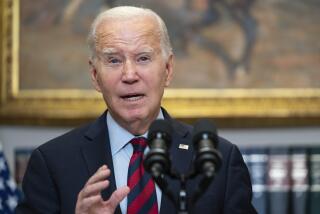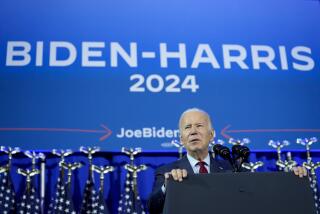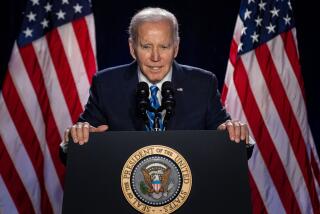Obama putting key priorities on hold until after midterm election
President Obama is taking time out from his much-trumpeted “year of action” to observe a period more important to his Democratic allies in Congress: the season of campaigning.
One by one, the Obama administration is setting aside key priorities, in the hope that voters won’t do the same to his fellow Democrats.
Immigration reform, once deemed a pressing back-to-school item, will wait at least until the winter holidays.
Enrollment in Obamacare will start six weeks later than last year. The climate will warm at the same rate, with new regulations pending.
The latest addition to the not-to-do list came this week, when the White House put off an announcement on the president’s nominee for attorney general, a pick he has been privately thinking about a long time.
White House aides smile and defend the strategy, saying privately that they’re trying to be sensitive to the concerns of Democrats, especially senators in tough election races.
The White House is trying to avoid being held responsible for Democrats losing control of the Senate in the midterm election in three weeks, especially when administration officials still hope to get a few things done during the final two years of Obama’s presidency and will need help from Democrats who remain in office.
But the delays frustrate some of Obama’s most reliable allies, who fear he is squandering what little time he has left to act on their biggest policy priorities.
“We wish they would be as good as their rhetoric,” said Frank O’Donnell, president of Clean Air Watch. “We want them to step up and deliver. If they don’t, who’s going to?”
The delaying tactics, others said, could shake the relationships Democrats rely on.
“It looks like the president and the Democrats are playing politics with people’s lives,” said Frank Sharry, founder and executive director of America’s Voice, an immigration reform group.
To be sure, Obama has acted on several issues, chiefly his decision to bomb Islamic State militants in Iraq and Syria. Domestically, he directed federal resources to stop the spread of Ebola after it was diagnosed in the U.S.
But though he repeatedly pledged early this year to use a “pen and phone” to get around an uncooperative Congress, recent months have seen little such executive action on major policy initiatives. What actions have been taken, such as new rules to discourage corporations from moving operations overseas for tax reasons, have fit squarely into Democrats’ campaign messaging.
Republicans have noticed. They accuse the White House and Democrats of trying to hide politically unpopular policies from voters.
Aides to the president have acknowledged some of the politics at play. When Obama said he would not act as promised on immigration until the end of the year, aides said they did not want the immigration policy overhaul to be blamed for Democratic losses in Congress, an outcome that could set back prospects for passage of legislation over the long term.
Relations with Democrats on Capitol Hill are already tense, and with the election looming, Obama and his aides are listening to lawmakers’ concerns.
Democratic leaders in the Senate had requested the delay on naming a nominee for attorney general, a White House official said Tuesday.
Obama will also wait until after the election to appoint a new leader of the often-controversial Civil Rights Division at the Justice Department, and a new strategy on reducing methane emissions due in the fall now seems aimed for the end of the season.
Control of the Senate is the key battle of the 2014 election. Democratic leaders in the chamber devoted much of this year’s legislative session to advancing bills tailored to boost their incumbents, while blocking efforts by Republicans to force votes on thornier matters.
On issues in which the administration signaled the president might use his executive powers to advance his priorities, key senators and party strategists made clear where they thought doing so might complicate Democratic chances in key races, sometimes using polling data to demonstrate the risk.
Aides said the decision to delay naming a replacement for Atty. Gen. Eric H. Holder Jr., though, was not such an issue.
“The timing is entirely up to the White House,” said Ben Marter, a spokesman for Sen. Richard J. Durbin (D-Ill.), the assistant majority leader.
The strategy of bunkering before an election is hardly new — the Obama administration tried a similar tack in 2012 — and Republicans have also held back this year.
House Speaker John A. Boehner (R-Ohio) recently said any formal debate over a resolution to authorize the president’s new military strategy against Islamic State militants should wait until a new Congress is sworn in come January.
Lawmakers have also chosen short-term fixes over longer-term solutions on spending bills, tax reform and other issues. For Republicans, delaying action in certain areas has been strategic, with an eye toward the possibility of a GOP Senate majority in tandem with the one in the House.
“This whole place is paralyzed. Everything was kicked down the road,” said a Senate aide, who was granted anonymity to candidly assess the state of play.
For its part, the White House denies political motives on some issues. A move on the Keystone XL pipeline to carry oil and gas across the U.S. and Canada, which sharply divided Democrats, was put off to let court appeals related to the project continue, officials said last spring in announcing an indefinite delay.
The decision to push back the healthcare enrollment period was made a year ago to give insurers more time to analyze claims and adjust rates, though it also means consumers won’t be notified of premium increases until after the election.
Asked whether the deadline was set last year with the election in mind, White House spokesman Josh Earnest dismissed the notion.
Observers may see politics at play, Earnest said, “but so many of the important policy decisions that are made in this administration and in this White House are driven by something other than politics.”
Some supporters defended what action Obama had taken.
The president has been “on a roll,” said Tiernan Sittenfeld, senior vice president of government affairs of the League of Conservation Voters, ticking off a list that includes a new clean-power plan and designation of several national monuments.
“The methane and ozone proposals are also top priorities,” Sittenfeld said, “and we hope to see them soon.”
No legal mechanisms are stopping the administration from acting before a court-imposed December deadline to develop a new ozone rule. But no one expects it before the election.
And although Obama said the Environmental Protection Agency had until “the fall” to deal with methane emissions, his agency chief recently suggested to reporters that there’s no rush on that, either.
“Fall,” observed EPA Administrator Gina McCarthy, “goes on for a long time.”
kathleen.hennessey@latimes.com
Michael A. Memoli, Neela Banerjee and Timothy M. Phelps in the Washington bureau contributed to this report.
More to Read
Get the L.A. Times Politics newsletter
Deeply reported insights into legislation, politics and policy from Sacramento, Washington and beyond. In your inbox three times per week.
You may occasionally receive promotional content from the Los Angeles Times.








